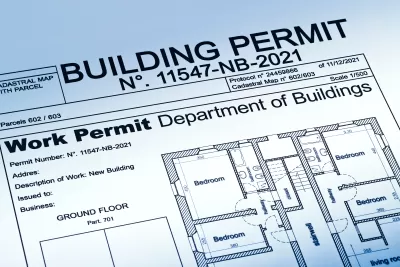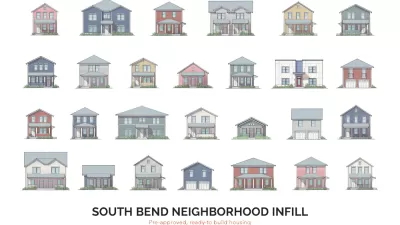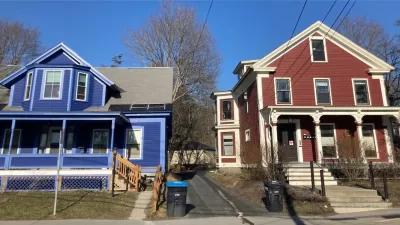Faced with blighted neighborhoods where the cost of building a house would exceed its eventual market value, the city of Kalamazoo, Michigan, streamlined the permitting process to help lower development costs.

By 2015, a state land bank program intended to fight blight had accumulated 267 derelict properties in Kalamazoo, Michigan. The problem? The cost of building a house eclipsed what its market value would be when finished. Without the financial incentive to build or improve homes in these neighborhoods, these areas just declined further, reports Ben Abramson of Strong Towns.
A coalition of city, county, and state agencies, along with housing developers, advocates, and nonprofits banded together to identify solutions to help them fill those vacant lots. The first fix: resolve the zoning issues that had rendered 67 percent of land bank acquisitions unbuildable and created financing hurdles for homeowners. The second solution: streamline the permitting process by creating a “pattern book” of pre-permitted housing plans and adding all required permits and inspections to the process, which effectively minimize costly variables and surprises.
After doing a proof of concept with a local nonprofit and ironing out some kinks, as of 2024, 48 homes have been built using Kalamazoo’s pre-permitted plans,” according to the Strong Towns article, including a stacked duplex, a four-bedroom standard house, a narrow house that can fit on a lot as small as 30 feet wide, and an ADU.
“Overall, KNHS says that in 2022, it helped 106 local residents buy or substantially improve their homes. It is also working to train local residents in the building trades to work on future projects,” Abramson writes. “Now the plans have been made available to small for-profit developers. In those cases they must prepay for all permits and inspections, but having access to proven, high-quality designs substantially lowers their upfront costs.”
FULL STORY: Pre-Permitted Plans Help Kalamazoo Bring Housing Back

Alabama: Trump Terminates Settlements for Black Communities Harmed By Raw Sewage
Trump deemed the landmark civil rights agreement “illegal DEI and environmental justice policy.”

Study: Maui’s Plan to Convert Vacation Rentals to Long-Term Housing Could Cause Nearly $1 Billion Economic Loss
The plan would reduce visitor accommodation by 25% resulting in 1,900 jobs lost.

Planetizen Federal Action Tracker
A weekly monitor of how Trump’s orders and actions are impacting planners and planning in America.

Grand Rapids Mayor Proposes Garage Conversion Plan
The mayor says allowing homeowners to convert garages to dwelling units could alleviate the city’s housing shortage.

Baltimore Ordered to Improve Sidewalk Accessibility
The city is one of many to face lawsuits for failing to comply with the Americans with Disabilities Act.

This Toronto Suburb Has More Bus Riders Than Columbus, Ohio
Brampton, Ontario used gradual improvements in service to prove that if you build it, they will ride.
Urban Design for Planners 1: Software Tools
This six-course series explores essential urban design concepts using open source software and equips planners with the tools they need to participate fully in the urban design process.
Planning for Universal Design
Learn the tools for implementing Universal Design in planning regulations.
Smith Gee Studio
Alamo Area Metropolitan Planning Organization
City of Santa Clarita
Institute for Housing and Urban Development Studies (IHS)
City of Grandview
Harvard GSD Executive Education
Toledo-Lucas County Plan Commissions
Salt Lake City
NYU Wagner Graduate School of Public Service





























